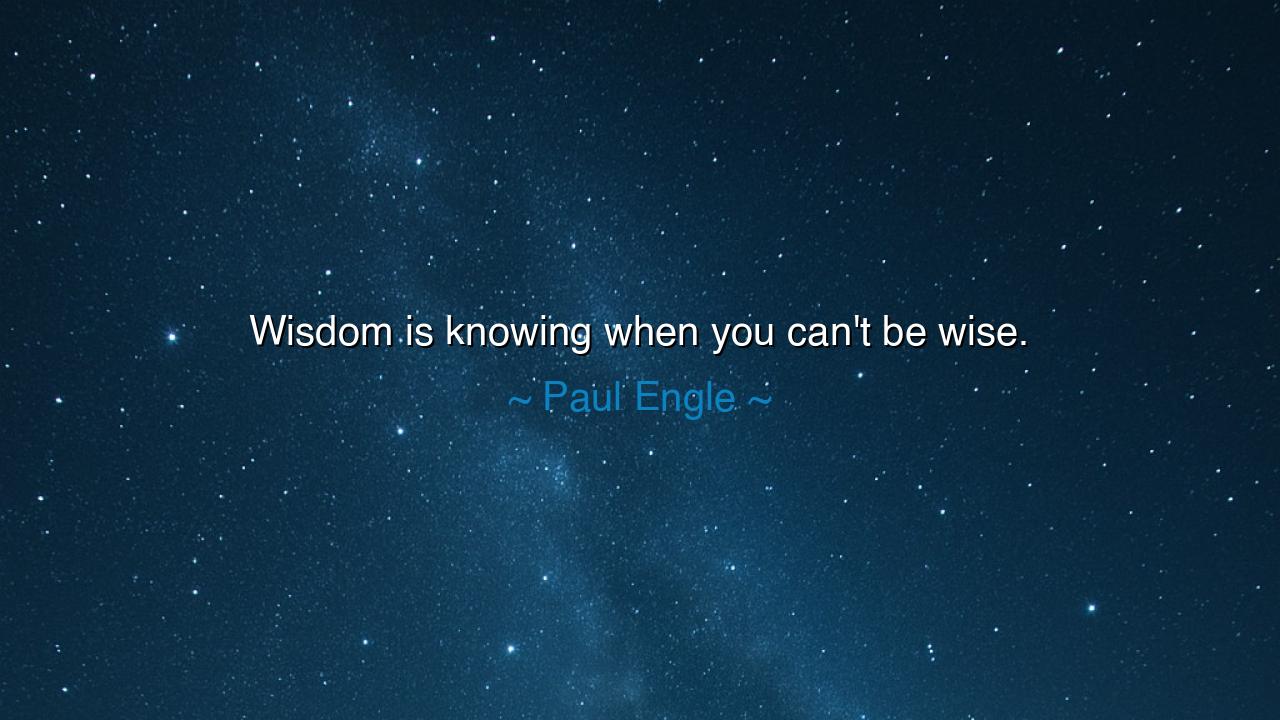
Wisdom is knowing when you can't be wise.






Paul Engle, poet and teacher, speaks with the clarity of one who has gazed into the paradox of human limitation. He declares that wisdom is not the endless exercise of cleverness, nor the proud insistence upon being right, but the humble recognition of those moments when one cannot be wise. In this confession lies a deeper strength, for to admit the boundary of one’s light is itself an act of illumination. Thus, true wisdom wears the cloak of humility, knowing that silence, patience, or surrender may be greater than a thousand words of counsel.
The ancients themselves honored this truth. The Delphic oracle commanded, “Know thyself,” and in this command was hidden the recognition of one’s limits. Even Socrates, the great philosopher, declared that his only wisdom was in knowing that he knew nothing. This was no jest, but the very heart of Engle’s insight: the wise man is not he who feigns omniscience, but he who bows before mystery and admits that even reason must sometimes fall silent.
History also reveals this lesson in the life of Abraham Lincoln. In the dark days of the American Civil War, he often confessed to his cabinet that he did not know the full path ahead, nor how to heal the bleeding nation. Yet his humility in confessing uncertainty opened the way for counsel, prayer, and patience. By admitting the limits of his wisdom, he allowed space for greater truths to emerge, and for decisions tempered not by pride but by caution and humanity.
So too in the realm of science: when Galileo stood before the might of the Church, he knew that wisdom was not to speak all he believed, for the moment was not ripe. To survive, to preserve his discoveries, he chose restraint rather than reckless declaration. In that moment, knowing when not to be wise in speech preserved wisdom for future generations, who would one day see the stars as he saw them.
Let the children of tomorrow remember: wisdom is not endless knowing, but timely knowing. To discern when to act and when to refrain, when to speak and when to hold silence—this is the mark of the truly wise. For there are seasons in life when even the greatest mind must bow, not in defeat, but in reverence to forces beyond its grasp. And in that bowing lies a strength more enduring than pride, a wisdom that no folly can corrupt.






ALHoang Anh Le
This statement provokes thought about emotional intelligence. Knowing when not to act or speak may prevent conflict and poor decisions, which is often undervalued in discussions about wisdom. But I also wonder if excessive caution could become a form of paralysis, preventing growth or learning. How does one balance the humility of recognizing limits with the courage to engage when necessary? It seems the art of timing and judgment is central to practical wisdom.
KMKhang Mu
Reading this makes me think about social and professional contexts. Sometimes, people insist on offering advice or solutions even when they lack understanding, leading to poor outcomes. This quote suggests a counterintuitive approach: restraint can be a sign of wisdom. I’m curious whether this idea aligns with modern leadership theories that emphasize listening and reflection, and whether recognizing our limits might actually enhance credibility and influence rather than diminish it.
TNthu trang nguyen
I find this perspective both comforting and humbling. It implies that making mistakes doesn’t negate wisdom as long as one knows their boundaries. Could it be that accepting our limitations is the first step toward deeper understanding? On the other hand, I worry about misjudging situations—what if we underestimate our ability to act wisely and miss opportunities? It raises a question: how can one train discernment to distinguish between genuine limitations and self-doubt?
NMDo Nhat Minh
This quote sparks curiosity about the nature of wisdom itself. Is part of being wise the ability to recognize one’s own ignorance or limitations? It makes me question whether traditional measures of intelligence or expertise truly capture the essence of wisdom. Perhaps the greatest thinkers are not those who always have answers, but those who know when to pause and reflect. I’m intrigued by how this mindset might affect personal growth and decision-making over a lifetime.
TLNgoc Tu Le
I feel a mix of relief and challenge reading this. It acknowledges that we cannot always provide solutions, which can take pressure off those striving to 'know it all.' But it also raises a concern: how does one discern between situations where withholding action is wise versus simply avoiding responsibility? I wonder if there are strategies or practices that help us recognize these moments more accurately, ensuring we act with both caution and integrity.